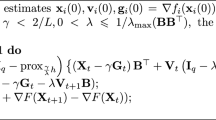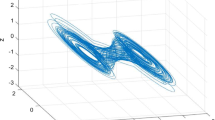Abstract
In this paper, the problem of leader-following consensus for a class of multi-agent systems with double integrator dynamics is investigated based on an iterative learning approach. Consensus errors of individual agents are considered as the anticipation in time, based on which a distributed iterative learning protocol is proposed for the undirected networks with fixed topology to make the followers track the leader in finite time. The dynamic of the leader is assumed to be time-varying and the state information is available to only a portion of the followers. The sufficient condition for solving the consensus problem of the multi-agent system is obtained. A simulation example is provided to demonstrate the effectiveness of the proposed method.
Similar content being viewed by others
References
Fax, A., Murray, R.: Information flow and cooperative control of vehicle formations. IEEE Trans. Autom. Control 49(9), 1465–1476 (2004)
Moreau, L.: Stability of multiagent systems with time-dependent communication links. IEEE Trans. Autom. Control 50(2), 169–182 (2005)
Zavlanos, M.A., Pappas, G.J.: Distributed connectivity control of mobile networks. IEEE Trans. Robot. 24(6), 1416–1428 (2008)
Zambonelli, F., Jennings, N.R., Wooldridge, M.: Developing multiagent systems: the Gaia methodology. ACM Trans. Softw. Eng. Methodol. 12(3), 317–370 (2003)
Wachowiak, M.P., Smolikova, R., Zheng, Y.F.: An approach to multimodal biomedical image registration utilizing particle swarm optimization. IEEE Trans Evol. Comput. 8(3), 289–301 (2004)
Fan, X., Chen, P., Yen, J.: An approach to multimodal biomedical image registration utilizing particle swarm optimization. Cogn. Syst. Res. 11(1), 108–119 (2010)
Zhu, S., Wang, D., Low, C.: Cooperative control of multiple UAVs for source seeking. J. Intell. Robot. Syst. 70(1), 293–301 (2013)
Guo, H., Yan, M.: Distributed reinforcement learning for coordinate multi-robot foraging. J. Intell. Robot. Systs. 60(3), 531–551 (2010)
Olfati-Saber, R.: Flocking for multi-agent dynamic systems: algorithms and theory. IEEE Trans. Autom. Control 51(3), 401–420 (2006)
Qi, H., Iyengar, S., Chakrabarty, K.: Multi resolution data integration using mobile agents in distributed sensor networks. IEEE Trans. Syst. Man Cybern. Part C Appl. Rev. 31(3), 383–391 (2001)
Hwang, H., Tan, S., Hsiao, H.: Cooperative multi-agent congestion control for high-speed networks. IEEE Trans. Syst. Man Cybern. Part B Cybern. 35(2), 255–268 (2005)
Olfati-Saber, R.: Consensus problems in networks of agents with switching topology and time-delays. IEEE Trans. Autom. Control 49(9), 1520–1533 (2004)
Ren, W., Beard, R.W.: Consensus seeking in multi-agent systems using dynamically changing interaction topologies. IEEE Trans. Autom. Control 50(5), 655–661 (2005)
Olfati-Saber, R., Fax, J., Murray, R.: Consensus and cooperation in networked multi-agent systems. Proc. IEEE 95(1), 1–17 (2007)
Hong, H., Hu, J., Gao, L.: Tracking control for multi-agent consensus with an active leader and variable topology. Automatica 42(7), 1177–1182 (2006)
Yu, W., Zheng, W., Chen, G., Ren, W., Cao, J.: Second-order consensus in multi-agent dynamical systems with sampled position data. Automatica 47(7), 1496–1503 (2011)
He, W., Cao, J.: Consensus control for high-order multi-agent systems. IET Control Theory Appl. 5(1), 231–238 (2011)
Bristow, D.A., Tharayil, M., Alleyne, A.G.: A survey of iterative learning control. IEEE Control Syst. Mag. 26(3), 69–114 (2006)
Xu, J., Zhang, S., Yang, S.: A HOIM-based iterative learning control scheme for multi-agent formation. In: Proceedings of the IEEE Conference on International Symposium on Intelligent Control, pp. 418–423 (2011)
Hyo-Sung, A., Chen, Y.: Iterative learning control for multi-agent formation. In: Proceedings of the ICROS-SICE International Joint Conference, pp. 3111–3116 (2009)
Schöllig, A., Alonso-Mora, J., Raffaello D.A.: Independent vs. joint estimation in multi-agent iterative learning control. In: Proceedings of the IEEE Conference on Decision and Control, pp. 6949–6954 (2010)
Hyo-Sung, A., Chen, Y., Moore, K.L.: Multi-agent coordination by iterative learning control: centralized and decentralized strategies. In: Proceedings of the IEEE Conference on Systems and Control, pp. 394–399 (2011)
Meng, D., Jia, Y.: Finite-time consensus for multi-agent systems via terminal feedback iterative learning. IET Control Theory Appl. 5(18), 2098–2110 (2011)
Meng, D., Jia, Y.: Iterative learning approaches to design finite time consensus protocols for multi-agent systems. Syst. Control Lett. 61(1), 187–194 (2012)
Liu, Y., Jia, Y.: Formation control of discrete-time multi-agent systems by iterative learning approach. Int. J. Control Autom. Syst. 10(5), 913–919 (2012)
Meng, D., Jia, Y.: Formation control for multi-agent systems through an iterative learning design approach. Int. J. Robust Nonlinear Control (2012). doi:10.1002/rnc.2890
Liu, Y., Jia, Y.: An iterative learning approach to formation control of multi-agent systems. Syst. Control Lett. 61(1), 148–154 (2012)
Yang, S., Xu, J.: Adaptive iterative learning control for multi-agent systems consensus tracking. In: Proceedings of the IEEE Conference on Systems, Man and Cybernetics, pp. 14–17 (2012)
Ren, W.: On consensus algorithms for double-integrator dynamics. IEEE Trans. Autom. Control 53(6), 1503–1509 (2008)
Horn, A., Johnson, R.: Matrix Analysis. Cambridge, U.K.: Cambridge Univ. Press (1987)
Author information
Authors and Affiliations
Corresponding author
Rights and permissions
About this article
Cite this article
Shi, J., He, X., Wang, Z. et al. Iterative Consensus for a Class of Second-order Multi-agent Systems. J Intell Robot Syst 73, 655–664 (2014). https://doi.org/10.1007/s10846-013-9996-2
Received:
Accepted:
Published:
Issue Date:
DOI: https://doi.org/10.1007/s10846-013-9996-2




